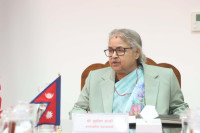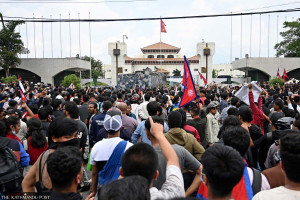Opinion
Laws for lawmakers
There should be a code barring MPs from House business if a conflict of interest exists
Dinesh Raj Shiwakoti
Whether a Member of Parliament (MP) should be barred or not from taking part in its affairs, including voting, if there is a conflict of interest has been a persistent issue in Nepal. It has been highlighted in recent times too. The other day, an MP who is also a director in a private commercial bank demanded at a parliamentary committee meeting that Nepal Rastra Bank withdraw its instruction to banks and financial institutions to increase their paid-up capital. The same MP was at the forefront when Parliament demanded specific changes in the bill that seeks to amend the Bank and Financial Institutions Act, despite the fact that it had been tabled by the government led by his own party. And now that MP is a member of the subcommittee entrusted with finalising the bill.
In yet another highly controversial case, a bunch of MPs having financial interests in the proposed for-profit institute Manmohan Academy have been busy lobbying and working to pass a bill to establish it. In doing so, are these MPs acting in the country’s interest or seeking to realise their vested interest by abusing their constitutional power? This issue has sparked a heated national debate. Some, including the MPs involved, see nothing wrong in their approach. They see their conduct falling within the permitted legal boundaries, and affirm it as a process in fulfilling their entrusted duties. Others, including civil society, bitterly contest those claims and question those MPs’ underlying motives.
Conflict of interest
In seeking to resolve the issue, we must look at it through an objective lens. The International Bar Association has created one. As per this universally accepted test, a “judge” must refrain from taking part in a case “if facts or circumstances exist, or have arisen since the appointment, that, from a reasonable third person’s point of view having knowledge of the relevant facts, give rise to justifiable doubts” as to the judge’s impartiality or independence. “Justifiable doubts necessarily exist as to the judge’s impartiality or independence if the judge has a significant financial or personal interest in the matter at stake.” Can or should this test, which is intended for judges, be applied to MPs too? While taking part in making or amending a piece of legislation, a process in which national interests are at stake, an MP must have the highest degree of integrity no less than that of a judge. So, it is reasonable that the bar for MPs be set at least at the same level if not higher than that for judges.
Section 103 of the Constitution of Nepal ensures the MPs’ freedom of expression and right to vote in Parliament and provides them, on these matters, immunity against any court proceedings. Understandably, these freedoms and immunity are vital in upholding Parliament’s sovereignty and supremacy. But does it grant MPs a free hand in any matter in parliamentary affairs even if their conduct undermines the letter and spirit of the constitution? The answer is no. The same section of the constitution stipulates that the immunity and freedoms are subject to an MP’s upholding the law while acting on any parliamentary matter. Taking part in matters involving a conflict of interest undermines that principle and flouts the very essence of the oath taken by the MPs in the name of the constitution and the nation.
Right and duty
So, what is the remedy? Parliament’s supremacy comes with an equal gravity of duty. It is thus the duty of Parliament to observe that its members act in the national interest and their conduct in no way compromises the constitution. This calls for, besides Parliament’s procedural rules, imposing a strict code of conduct for the MPs in discharging their entrusted obligations by a parliamentary resolution.
The code must establish the principles of conduct expected of the MPs in undertaking their duties, and set out the underpinning rules of conduct. The standards must consider parameters including selflessness, integrity, objectivity, accountability, transparency and honesty. And the code’s underlying rules must address the issue of conflict of interest, and the procedure for registration and disclosure of interest, investigation of an alleged breach of the code and sanctions against the breach.
Such codes have been imposed for MPs even in legally advanced jurisdictions. The UK’s House of Commons, for example, requires its members to register their interest and compels them to disclose their interest before taking part in any proceedings of the House. Any member of the public or an MP may lodge a complaint against an alleged breach of the code. If an investigation shows that there has been a serious breach of the code, its Parliamentary Commissioner for Standards is empowered to recommend the MP’s expulsion from the House.
Like any piece of legislation, the Constitution of Nepal cannot function in a vacuum. Currently, in the absence of a strict code of conduct, our Parliament stands on dangerous ground and is vulnerable to abuse by vested interest groups. No doubt, our national interests are at stake. All sensible and responsible Nepali individuals and organisations including MPs, professional organisations and civil society must press for the establishment of the code, see that it is created, and ensure that it is followed.
Shiwakoti is a Fellow of the Chartered Institute of Arbitrators and Adjudicator/Arbitrator at the Kuala Lumpur Regional Arbitration Centre




 16.24°C Kathmandu
16.24°C Kathmandu












